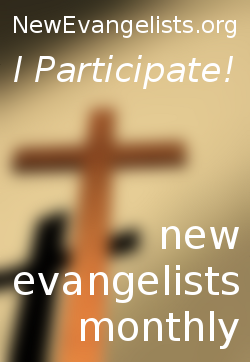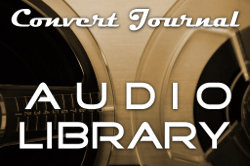
Last Sunday I had the good fortune to hear a friend and neighbor, a Protestant minister, speak on accepting Jesus. He spoke of our Lord’s patience, always waiting for us to let Him in. As an illustration, he showed a picture of one of the stained glass windows in his church. It was inspired by well known paintings depicting Jesus knocking softly at a door, without a latch, locked from the inside. This represents us holding back, sometimes tuning-out the knocking, and not letting Jesus into our hearts.
The speaker used a good scripture reference in support of how our Lord comes to us, softly:
Then the LORD said: Go out and stand on the mountain before the LORD; the LORD will pass by. There was a strong and violent wind rending the mountains and crushing rocks before the LORD — but the LORD was not in the wind; after the wind, an earthquake — but the LORD was not in the earthquake; after the earthquake, fire — but the LORD was not in the fire; after the fire, a light silent sound.
When he heard this, Elijah hid his face in his cloak and went out and stood at the entrance of the cave.
Good stuff, beautifully presented. We cover this reading BTW, on the Nineteenth Sunday of Ordinary Time in cycle A (most recently: August 7, 2011).
My friend went on to note how it is our choice to let Jesus in. So very true. He then used the story of the disciples walking to Emmaus to illustrate the point. As they walked along, he said, Jesus was not yet revealed to them until they came to a fork in the road and invited him in.
I grant that loosely interpreted there is truth in this, and this was offered in support of his topic, but it really misses the point of Emmaus. The story of Emmaus is very important and worth a close look.
The setting is this: it is Easter afternoon, 2 disciples have left Jerusalem headed for Emmaus. They are uncertain about what just happened, but despondent none-the-less that Jesus apparently was not the redeemer they had hoped for. Let’s take a look:
Now that very day two of them were going to a village seven miles from Jerusalem called Emmaus, and they were conversing about all the things that had occurred. And it happened that while they were conversing and debating, Jesus himself drew near and walked with them, but their eyes were prevented from recognizing him. He asked them, “What are you discussing as you walk along?” They stopped, looking downcast. One of them, named Cleopas, said to him in reply, “Are you the only visitor to Jerusalem who does not know of the things that have taken place there in these days?” And he replied to them, “What sort of things?” They said to him, “The things that happened to Jesus the Nazarene, who was a prophet mighty in deed and word before God and all the people, how our chief priests and rulers both handed him over to a sentence of death and crucified him. But we were hoping that he would be the one to redeem Israel; and besides all this, it is now the third day since this took place. Some women from our group, however, have astounded us: they were at the tomb early in the morning and did not find his body; they came back and reported that they had indeed seen a vision of angels who announced that he was alive. Then some of those with us went to the tomb and found things just as the women had described, but him they did not see.” And he said to them, “Oh, how foolish you are! How slow of heart to believe all that the prophets spoke! Was it not necessary that the Messiah should suffer these things and enter into his glory?” Then beginning with Moses and all the prophets, he interpreted to them what referred to him in all the scriptures.
As they approached the village to which they were going, he gave the impression that he was going on farther. But they urged him, “Stay with us, for it is nearly evening and the day is almost over.” So he went in to stay with them. And it happened that, while he was with them at table, he took bread, said the blessing, broke it, and gave it to them. With that their eyes were opened and they recognized him, but he vanished from their sight. Then they said to each other, “Were not our hearts burning [within us] while he spoke to us on the way and opened the scriptures to us?” So they set out at once and returned to Jerusalem where they found gathered together the eleven and those with them who were saying, “The Lord has truly been raised and has appeared to Simon!” Then the two recounted what had taken place on the way and how he was made known to them in the breaking of the bread.
The disciples do not come to a fork in the road, but as evening approaches they arrive at their destination. Jesus is not revealed to them, but rather gratefully invited to stay as one might invite a rabbi after a day of instruction. It was not until later at the meal where Jesus “took bread, said the blessing, broke it, and gave it to them” that He was revealed. It was then that they responded “at once.”
Jesus was revealed in the Eucharist!
Here is how I would summarize this scripture:
- it is Easter Sunday
- disciples are gathered (2 in this case)
- Jesus is literally present
- the disciples confess their troubles to Christ
- Holy Scripture is proclaimed and interpreted
- Jesus consecrates the Eucharist
- the disciples receive Him
- they immediately depart to share the Good News
Does this remind you of anything? It is the Mass. Every Sunday we return to Easter as we disciples gather to hear the Word of God and receive our Lord. He is literally present and it is He (through His priest) who consecrates the Eucharist we receive. Immediately after that, strengthened and sustained by Him, we are sent to announce the Gospel of the Lord.
That is The Most Holy Sacrifice of the Mass today, throughout the centuries, in the very early Church and on the road to Emmaus. What a privilege it was for these disciples to meet Jesus in this way! What a privilege it is for us too, every time we participate at Mass.
Recently I described the nature of the Mass thus: it is a respite from the fallen world, a place where heaven and earth touch in the presence of our Lord. It is He, speaking to us from the Last Supper, who consecrates the Blessed Sacrament. We join Him there in the upper room, through His passion all the way to the foot of the cross. His sacrifice is real and present upon the altar now before us. Being consumed by Him worthily, our venial sins are forgiven and we are in communion with with Him, all the angels and saints, and our brothers and sisters present with us, at every Mass ever offered in the past and every Mass ever to be offered in the future. How awesome is that!



























“Jesus was revealed in the Eucharist!”
And can you imagine how tragic it would have been if those disciples had NOT recognized Jesus when He revealed Himself to them in the Eucharist? As St Paul put it: “whoever eats and drinks without recognizing the body, eats and drinks judgment on himself.”